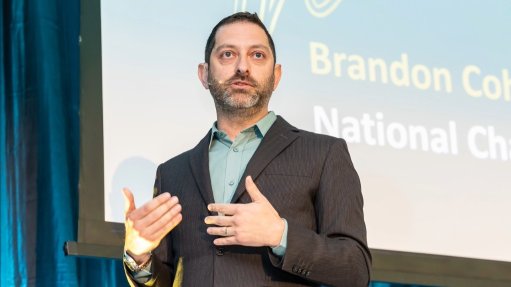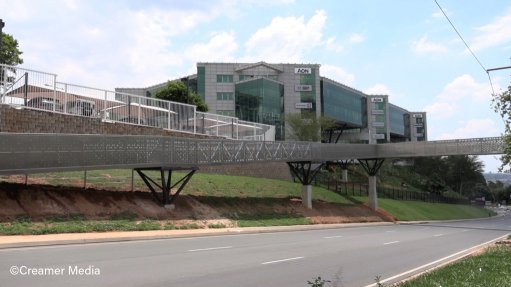Public–private partnerships could play role in ensuring water security
As climate change and its effects such as erratic weather patterns intensify, coupled with rapid urbanisation and population growth, municipalities and metros would do well to pursue more public–private partnerships (PPPs) to guarantee water supply to citizens, a panel of experts who participated in a webinar hosted by Creamer Media earlier this month averred.
Globally, government bodies are increasingly making use of PPP procurement models to source solutions in the water space – according to training organisation PPP Training Online CEO Andre Kruger, only ten countries in Africa do not have PPP regulations or policies.
Egypt, for example, has desalination PPPs in place, while Kenya is in the process of undertaking 100 small-dam PPPs.
Kruger highlighted a bulk water PPP in Rwanda as one of the largest on the continent, with the Kigali government having realised it does not have sufficient bulk water supply for the city.
He explained that PPPs target value for money, meaning money is spent effectively and efficiently over a long period.
South Africa, Kruger believes, “is in trouble” with its pipeline of water supply and wastewater treatment projects.
He added that a number of municipalities in the country are dysfunctional, with numerous dysfunctional wastewater and water treatment plants. Additionally, national government has failed to develop a Water Security Plan, which it intended to develop but was never finalised.
Kruger suggested local governments could reference successful examples of PPPs in other African countries to develop sustainable water and sanitation infrastructure.
He identified major challenges in the country as being a lack of good governance at municipal level, exacerbated by a lack of competent technical and financial managers at municipalities.
“Firstly, we need to fix governance by making sure competent people are appointed to the right positions. The next thing we need is improved long-term financial planning, as well as modernised long-term asset management plans, supported by engineering expertise. A credible and financially stable municipality is able to effectively negotiate with the private sector,” Kruger stated.
For example, he mentioned Uganda having identified a problem with its small municipalities struggling to deliver services, following which a transaction adviser was tasked to identify 100 projects, with the number subsequently narrowed down to eight projects that showed good governance. The Uganda government then proceeded to provide viability gap funding for these projects, to enable the PPP deals to proceed, all within six months.
“PPPs are being used worldwide to stimulate economic growth,” Kruger said, adding that the private sector can respond to risks more effectively and manage costs more efficiently, owing to experience.
Notably, he explained, the private sector does not gain legal ownership of an asset in PPP agreements; rather, it gets economic ownership before handing the project back to government. PPPs are also highly regulated, to ensure the protection of all parties.
The internal rate of return that the private sector will make over the project life is determined at the outset in the contract. Sometimes these returns only materialise fully towards the end of the project life.
Kruger mentioned that a study undertaken by the World Bank on South Africa’s PPP regulations suggested that various aspects be implemented by the National Treasury, and the World Bank published a tender for consultants to help the Treasury with the implementation of the changes six weeks ago.
Partnership in Action
eThekwini Water and Sanitation commercial and business senior manager Dhevan Govender highlighted that the city has arguably one of the most successful PPPs on the continent in place through its Durban Water Recycling Project.
Water scarcity in KwaZulu-Natal led to the municipality requiring assistance with the treatment of domestic and industrial sewage and wastewater to near potable standards for use in industrial processes.
To this end, water solutions company Veolia started operating a highly specialised tertiary water treatment process, capable of treating 47.5-million litres a day of wastewater for sale to industrial customers such as paper and packaging group Mondi, which consumes up to ten megalitres of water a day in its operations.
“The Durban Water Recycling Project demonstrates that innovative approaches to water resource management, environmental management, wastewater treatment technology and institutional arrangements can yield exceptional results,” Govender said, adding that the PPP was formed at a time when there was no municipal Act in place for such agreements and it laid the foundations for regulations that came afterwards.
During the 20-year concession period, there had not been downtime at the plant and the municipality was able to concentrate on its core function of water distribution, while the private party supplied key industries with quality water.
Govender revealed that eThekwini is in the process of finalising five PPPs worth more than R10-billion – ranging from water reuse and treatment to renewable-energy projects.
Commenting on why PPPs have not been more prevalent in the country, he shared eThekwini’s experience, explaining that, back in 2000, the water division of the municipality operated as a business unit, with support services under one unit, led by an executive director with full authority and control. This allowed for quicker decision- making and more focused service delivery.
This has since changed, however, with government moving from a decentralised setup to a centralised one, with support services such as human resources and finance now having been centralised.
“It takes about nine to 12 months to get a tender out now, that is, without any appeals in the process. This was not the case 20 years ago, when we were operating as a business unit,” Govender stated.
He added that PPPs have become unpopular, owing to the political buy-in that is required.
“PPPs are not an answer for all projects, but [they are] the best vehicle for large infrastructure projects such as water and wastewater treatment. PPPs are the way to go for guaranteed water supply,” Govender notes.
He added that among the new PPPs is one looking at alternative supply of water to diversify away from Umgeni Water, which is the main supplier in Durban. The city is looking to secure 20% of its supply, or 200 megalitres, from alternative water sources.
His advice for utilities undertaking PPPs is to seek project preparation funding from the Treasury or international bodies such as the International Finance Corporation, the African Development Bank and the Development Bank of Southern Africa.
“The municipalities need to move away from doing feasibility studies that are shelved and rather appoint transaction advisers, secure project funding and move to the implementation phase. There are various infrastructure grants and expertise offered by the Treasury, to get projects shovel ready,” Govender explains.
Sludge disposal is another key area of focus for eThekwini, to not only generate a new revenue stream for the city but also unlock wastewater treatment as an energy source and advance the circular economy.
Responding to whether there is private- sector appetite for PPPs, Govender said there is certainly local and international interest from equity investors and technology providers.
It is, however, not viable for the private sector to come on board for short-term projects, as capital cannot be redeemed over a three- or five-year timeframe, hence the need for long-term investment opportunities.
Technology Perspective
Water technology provider Xylem strategy and marketing manager Chetan Mistry said a number of people still do not have access to clean water and sanitation in Africa, with urbanisation and rapid population growth occurring in many cities.
He explained that African cities’ infrastructure is often insufficiently developed to keep up with demand. To this end, technology can ramp up opportunities that exist. “We see technology as part of the strategy and the realisation of utilities’ goals. Technology can monitor water use to ensure uptime, right conditions of service and enable preventive maintenance to be done.
“Nonrevenue water is a big issue globally. The losses of water itself drive problems around gaining revenue to reinvest in more infrastructure and technologies,” Mistry explained.
Xylem offers assessment solutions that monitor pipelines to prevent breakages and ensue optimal water management, as well as treatment technologies with small footprints. Many of the company’s solutions are based on specific localities and are designed in a bespoke manner.
Mistry emphasised the importance of having the proper equipment in the water environment, as downtime has multiple ramifications on quality of life, profitability and sustainability in a city. To this end, the private sector can ensure economic viability, while government maintains the social elements of the service.
“These balances are critical from our perspective as a technology provider and we encourage these partnerships,” he added.
He agreed with Govender that long-term agreements that span decades allow for capital certainty and accurate cost-per- litre estimations. Long-term agreements also allow for managed revenues, to account for every drop produced.
Mistry warned that with high-end technology comes the need for skills to manage these technologies and interpret data effectively. He stressed the importance of skills transfer once the concessional period of a PPP ends and the project is handed back to government.
Govender and Kruger shared the same sentiment, noting that transaction advisers need high levels of skill, as do the people in charge of technology.
This is especially relevant during times of crises such as flooding, when PPPs can provide budget certainty and guaranteed services.
Article Enquiry
Email Article
Save Article
Feedback
To advertise email advertising@creamermedia.co.za or click here
Comments
Press Office
Announcements
What's On
Subscribe to improve your user experience...
Option 1 (equivalent of R125 a month):
Receive a weekly copy of Creamer Media's Engineering News & Mining Weekly magazine
(print copy for those in South Africa and e-magazine for those outside of South Africa)
Receive daily email newsletters
Access to full search results
Access archive of magazine back copies
Access to Projects in Progress
Access to ONE Research Report of your choice in PDF format
Option 2 (equivalent of R375 a month):
All benefits from Option 1
PLUS
Access to Creamer Media's Research Channel Africa for ALL Research Reports, in PDF format, on various industrial and mining sectors
including Electricity; Water; Energy Transition; Hydrogen; Roads, Rail and Ports; Coal; Gold; Platinum; Battery Metals; etc.
Already a subscriber?
Forgotten your password?
Receive weekly copy of Creamer Media's Engineering News & Mining Weekly magazine (print copy for those in South Africa and e-magazine for those outside of South Africa)
➕
Recieve daily email newsletters
➕
Access to full search results
➕
Access archive of magazine back copies
➕
Access to Projects in Progress
➕
Access to ONE Research Report of your choice in PDF format
RESEARCH CHANNEL AFRICA
R4500 (equivalent of R375 a month)
SUBSCRIBEAll benefits from Option 1
➕
Access to Creamer Media's Research Channel Africa for ALL Research Reports on various industrial and mining sectors, in PDF format, including on:
Electricity
➕
Water
➕
Energy Transition
➕
Hydrogen
➕
Roads, Rail and Ports
➕
Coal
➕
Gold
➕
Platinum
➕
Battery Metals
➕
etc.
Receive all benefits from Option 1 or Option 2 delivered to numerous people at your company
➕
Multiple User names and Passwords for simultaneous log-ins
➕
Intranet integration access to all in your organisation

















